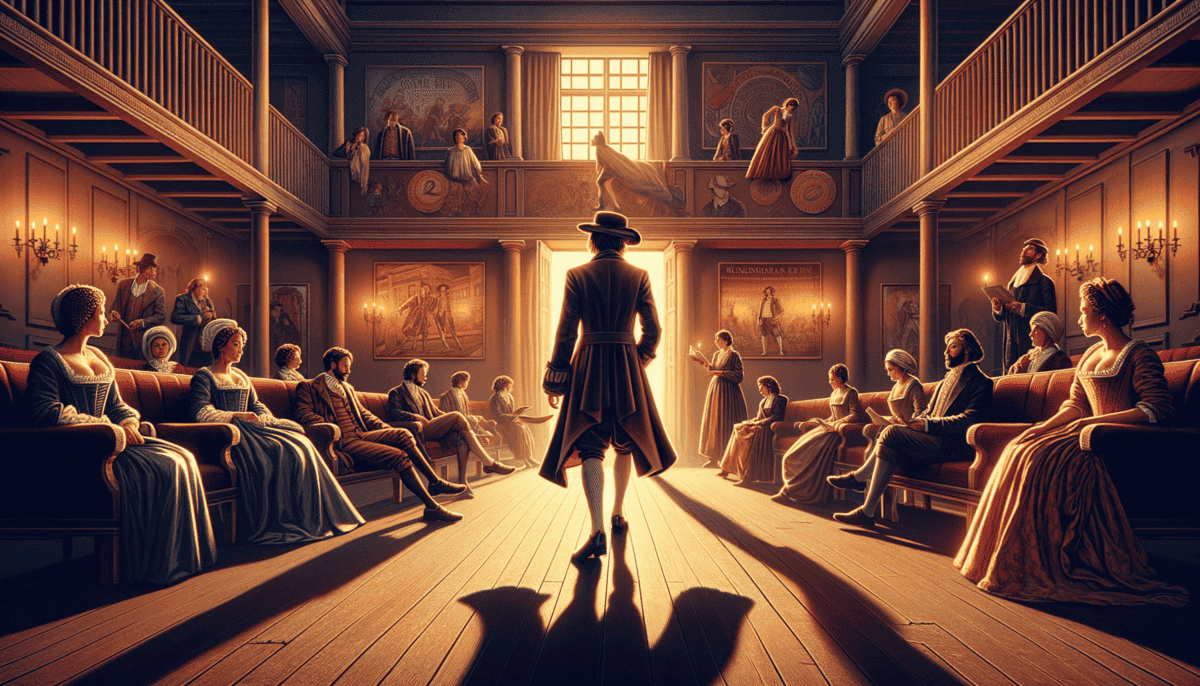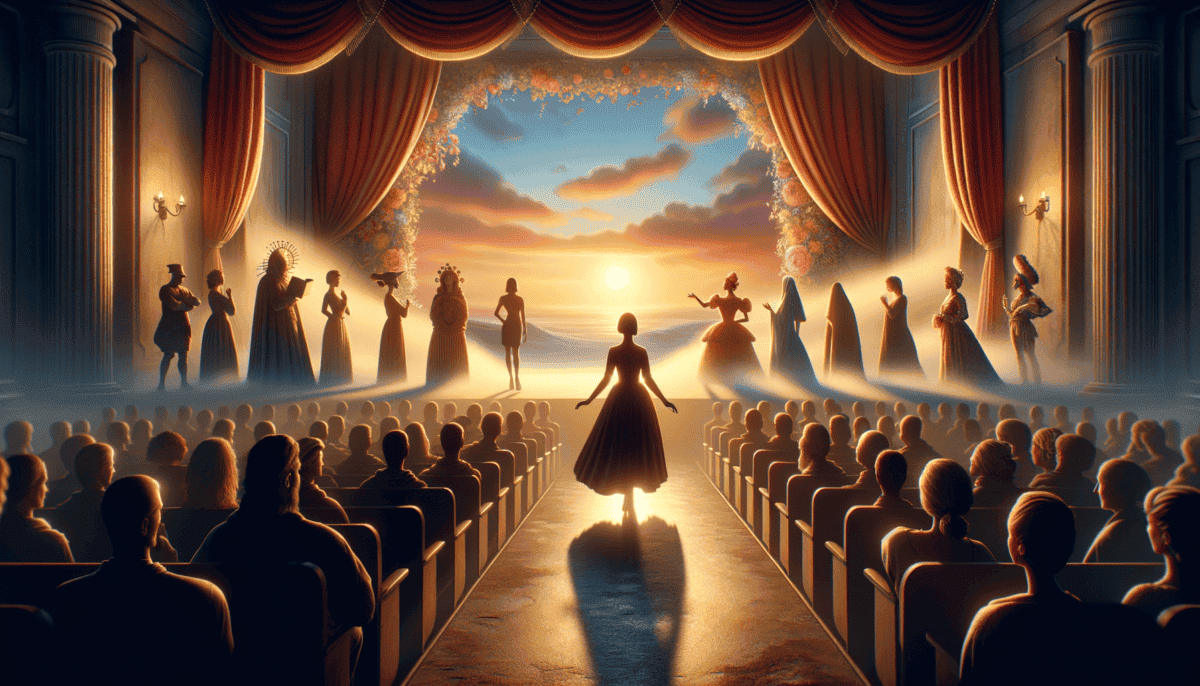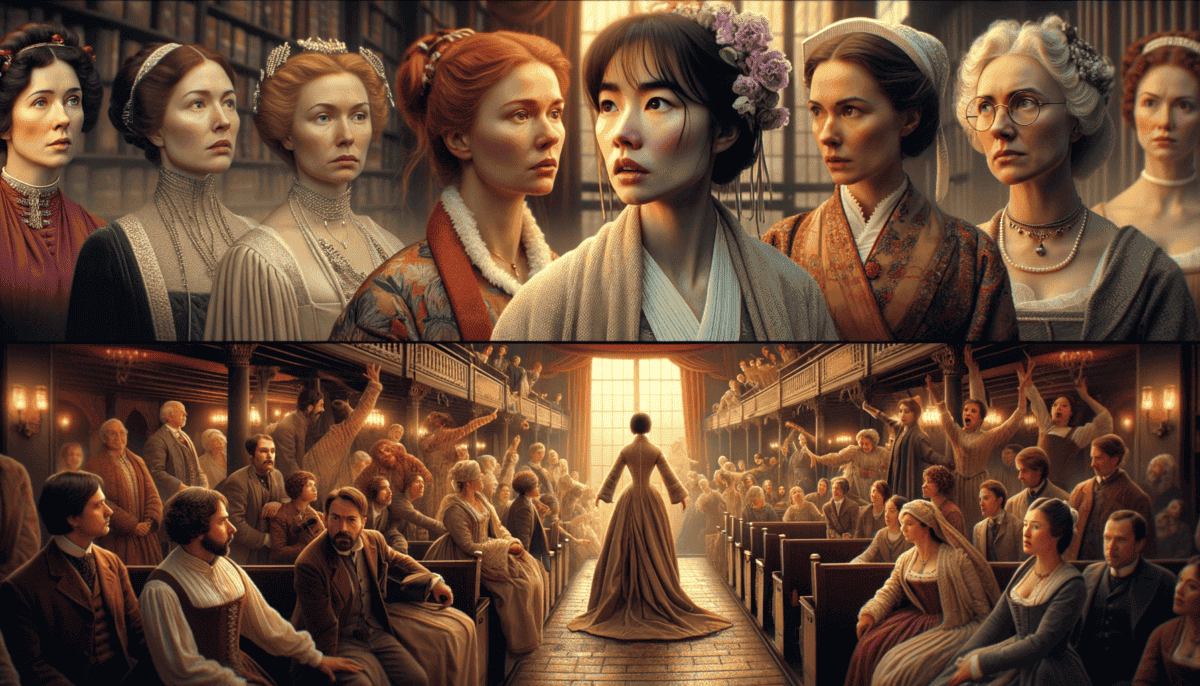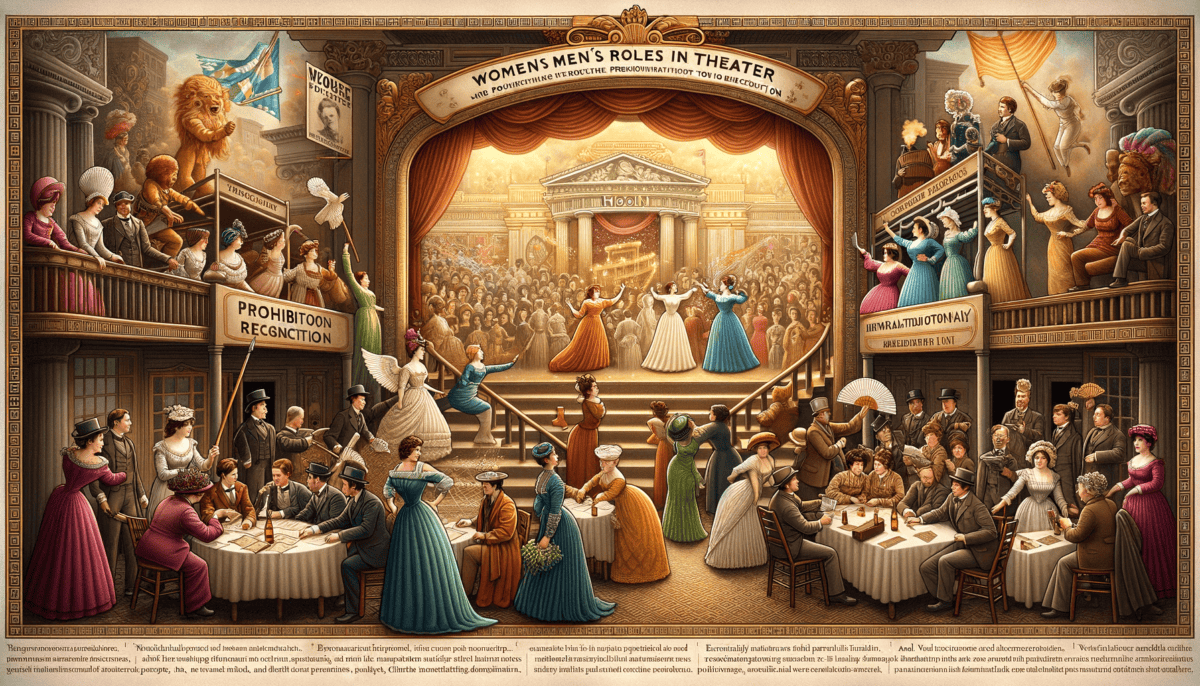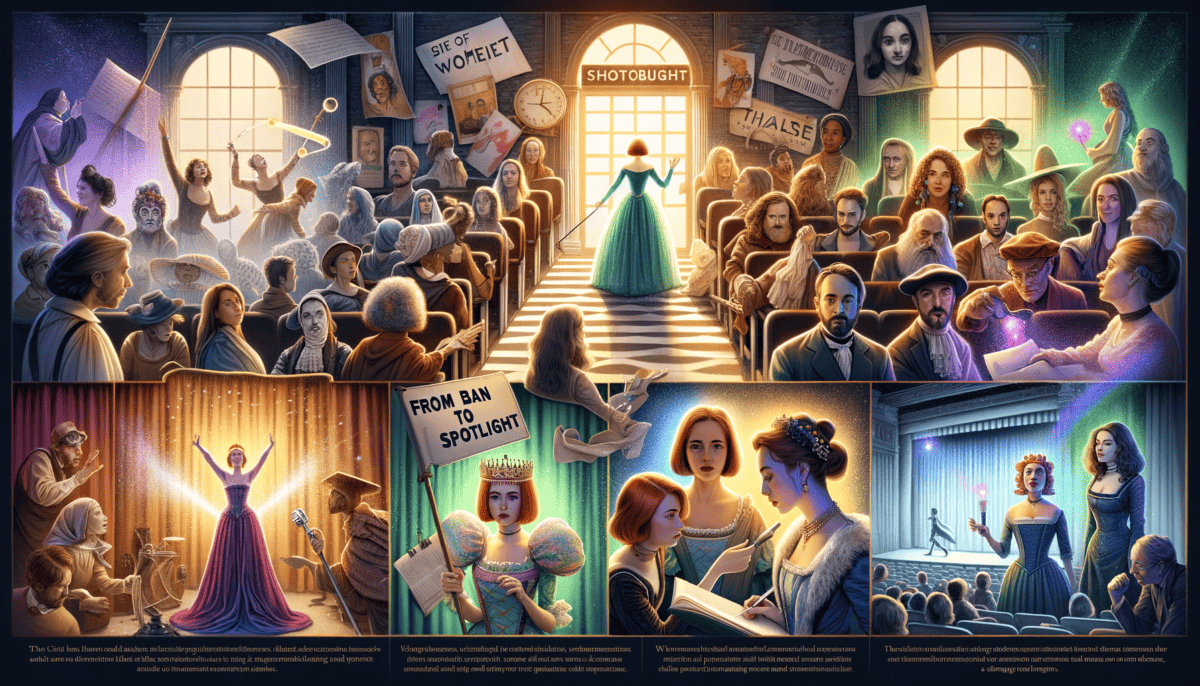Shadows Behind the Curtain
Long ago, in ancient Greece, something wasn't fair. Girls and women couldn't act in plays!
"But why can't I be in the play?" young Sophia asked her mother as they walked past the grand theater in Athens. The marble columns cast long shadows in the setting sun.
Her mother squeezed her hand. "That's just how things are, little one. Only men and boys can perform."
Inside the theater, men wore masks and fancy costumes. They played all the parts – even the girl parts! They used high voices when they had to act like women or girls.
The rules about women not acting came from old ideas. Many people thought it was wrong for women to perform in public. They said women should stay home and be quiet.
But that didn't stop women from loving theater! They watched plays from special seats. Some even wrote stories in secret.
"Look mommy!" Sophia pointed to a group of actors practicing. "That man is wearing a dress to play a princess!"
The practice of men playing women's roles spread to other places too. In England, during the time of Shakespeare, boys would start training very young to play girl parts. They learned to move gracefully and speak softly.
The Hidden Artists
Some brave women found clever ways to share their talent. They would put on small shows at home for their families. Others told stories through dance or song when no one was watching.
"I practice acting in my room," Sophia whispered to her mother. "Sometimes I pretend to be a brave hero or a wise queen."
Her mother smiled sadly. "Maybe someday things will be different, my love."
• Religious rules
• Social customs
• Laws against female performers
• Fear of breaking traditions
The sun was setting as Sophia and her mother headed home. Behind them, male actors continued rehearsing their parts. But change was coming, even if they didn't know it yet.
Every night, Sophia would look at the stars and dream of a time when girls could act in plays too. She didn't know it, but many other girls were having the same dream.
The theater held its secrets like the masks the actors wore. But just as day follows night, new ideas were starting to grow. Women's voices would not stay silent forever. Their time to shine was getting closer, even if it seemed far away.
"Tell me a story about a girl who gets to be in plays," Sophia asked her mother as they walked home.
"Once upon a time," her mother began, "there was a brave girl who believed in her dreams…"
The story continues, as does the dream of women who yearned to share their gifts with the world. Things would not stay the same forever – change was coming to the theater, one small step at a time.
Whispers of Rebellion
The sun was rising over London’s cobblestone streets. A young woman named Lucy pulled her cap lower over her face. She was about to do something very brave – and very dangerous.
“Are you sure about this?” her friend Mary whispered. They stood in a dark alley near the theater.
Lucy nodded. “I’ve practiced for months. They’ll never know I’m a girl.”
Secret Shows and Hidden Dreams
It was the time of Queen Elizabeth I in England. Women still weren’t allowed to act in plays. But some, like Lucy, found clever ways around the rules.
Lucy had spent weeks learning to walk and talk like a boy. She wrapped cloth around her chest and practiced making her voice deeper. At night, she would perform secret shows in hidden rooms.
“What if someone finds out?” Mary asked, helping Lucy adjust her boy’s clothes.
“Then I’ll run very fast!” Lucy laughed, but both girls knew it wasn’t really funny. Getting caught could mean jail or worse.
Underground Theater
All across England, women were getting tired of sitting quietly. They started putting on secret plays in their homes. Rich ladies would invite friends to watch shows in their private gardens.
• Dressed as boys
• Put on plays in private homes
• Formed secret acting groups
• Performed at night when few people were around
“Break a leg!” Mary hugged Lucy before she slipped into the theater’s back door. Inside, Lucy joined the other actors – all boys and men who had no idea there was a girl among them.
“You there, new boy!” the theater manager called. “You’re on next. Don’t mess up!”
Lucy’s heart was beating fast as she stepped onto the stage. The wooden boards creaked under her feet. The audience looked like a sea of faces in the morning light.
She opened her mouth and began to speak her lines. Her voice was clear and strong. The audience leaned forward, caught up in the story she was telling.
A Taste of Freedom
For one magical hour, Lucy got to be what she had always dreamed of – an actor. She forgot about being scared. She forgot about pretending to be a boy. She just lived in the joy of performing.
After the show, Lucy ran back to meet Mary. Her eyes were shining with happiness.
“How did it feel?” Mary asked, helping Lucy escape through the back streets.
“Like flying,” Lucy said. “Like being truly free.”
More and more women were starting to feel the same way. They weren’t going to stay quiet anymore. They wanted to act, to perform, to share their stories with the world.
Change was coming. The whispers of rebellion were growing louder. Soon, they would become a roar that no one could ignore.
As Lucy and Mary disappeared into the crowded streets of London, they carried with them a spark of hope. A hope that one day, women wouldn’t have to hide to follow their dreams.
A Royal Wind of Change
The year was 1660, and something big was about to happen in England. King Charles II sat on his golden throne, thinking hard.
“Your Majesty,” said his advisor, bowing low. “The theaters have been closed for too long. People miss the plays.”
The King nodded. “Yes, but this time, we’ll do things differently.”
The King’s Big Decision
King Charles II had seen plays in France where women got to act. He liked how real the shows felt when ladies played the girl parts. In England, boys still had to dress up as girls in plays.
“I have made up my mind,” the King announced. “From today, women can act in theaters!”
The First Lady on Stage
Margaret Hughes was ready. She had been practicing for years, waiting for this chance.
“Are you nervous?” asked her friend backstage.
Margaret smoothed her beautiful dress. “A little. But mostly excited!”
She was about to be the first woman to legally act on an English stage. The theater was packed with people who wanted to see history happen.
• 1660 – King Charles II allows women to act
• Margaret Hughes becomes the first legal actress
• More theaters start hiring women
• Plays start being written with better parts for women
Not Everyone Was Happy
Some people didn’t like the change. They said mean things about the new actresses.
“Ladies shouldn’t be on stage!” grumbled some old men.
But Margaret and other brave women didn’t listen to the mean words. They knew they were making things better for all women.
“Let them talk,” Margaret said to her friends. “We’ll show them how amazing we can be!”
A New World Opens Up
Soon, more women started acting in plays. They played queens, fairies, and regular people. The audiences loved seeing real women tell stories on stage.
Nell Gwyn was another famous actress from this time. She was funny and smart, and even the King came to see her shows!
Young girls watching the shows started to dream new dreams. Maybe they could be actresses too! They didn’t have to hide or pretend anymore.
“Times are changing,” Margaret told a group of young actresses. “The stage belongs to everyone now.”
The theaters became more colorful and exciting with women performing. Plays got better because writers could tell all kinds of stories, not just ones with boy actors.
Every night, when the curtain went up, the audience saw something they had never seen before – women standing proud and tall, sharing their talent with the world.
And somewhere, in the back of the theater, Lucy – the girl who once had to dress as a boy to act – watched with tears of joy in her eyes. The whispers of rebellion had turned into shouts of victory.
Stars of the Stage
The theater world was changing fast! Women were now allowed to act, and two special stars were shining bright – Margaret Hughes and Nell Gwyn.
Margaret Hughes – The First Star
Margaret Hughes wasn’t just any actress. She was the very first! She played a character named Desdemona in a play called “Othello.”
“I feel like I’m dreaming,” Margaret told her friends before her first big show. “All these years of waiting, and now here we are!”
Nell Gwyn – The People’s Favorite
Nell Gwyn started by selling oranges in the theater. But she had big dreams!
“One day,” she would tell herself, “I’ll be up there on that stage.”
And guess what? She did it! Nell became one of the most famous actresses ever. She was especially good at making people laugh in funny plays.
Life as an Actress
Being an actress wasn’t easy. The women had to:
• Practice moving and speaking clearly
• Work long hours at the theater
• Deal with mean people who didn’t like women actors
• Be brave and strong every day
“It’s hard work,” Margaret would say to new actresses, “but it’s worth every minute!”
Making Friends and Fans
The actresses started to get lots of fans. People would line up to see their shows!
“Miss Hughes, you were wonderful!” fans would say after the shows.
Nell Gwyn was so popular that even King Charles II became her friend. He loved watching her perform and would clap the loudest.
Teaching Others
Margaret and Nell helped other women learn to act too. They wanted to share their love of theater.
“Stand tall,” Margaret would tell her students. “Speak clearly. Be proud!”
Nell would add, “And most importantly, have fun!”
Making Theater Better
Having women on stage made plays more fun to watch. Writers started writing better parts for women. The stories got more interesting!
“Now we can tell all kinds of stories,” said one happy writer. “Not just ones where boys pretend to be girls!”
The theaters were fuller than ever. People loved seeing women play queens, mothers, and heroes.
A Growing Family
The theater became like a big family. Everyone worked together to make the shows great.
“We help each other,” Margaret would say. “That’s what makes us strong.”
Young actresses would watch Margaret and Nell from backstage, dreaming of their own big moments. The stage was now a place where any girl could shine.
Every night, when the curtain went up, Margaret and Nell would smile at each other. They knew they were part of something special – they were helping to change the world, one play at a time.
And in the audience, little girls watched with wide eyes, knowing they too could grow up to be stars of the stage. The future was getting brighter every day!
Breaking New Ground
As the calendar turned to the 1800s, women in theater were ready for more! They didn’t just want to act – they wanted to write plays and be directors too.
The Writing Room
Meet Anna Cora Mowatt! She was one of the first women to write big plays in America.
“I have so many stories to tell,” Anna would say. “Stories about real women, not just make-believe ones.”
Taking Charge
Laura Keene didn’t just want to act – she wanted to run the whole show!
“Why can’t I be the boss?” she asked. And then she did it! Laura opened her own theater in New York City in 1855.
She picked the plays, chose the actors, and made sure everything looked just right. She was like a captain steering a big ship!
Around the World
Women in different countries started doing amazing things in theater:
• England had Ellen Terry, who taught other actresses
• Japan welcomed its first actresses after hundreds of years
• India saw women join traditional theater groups
• Russia had great actresses in their big theaters
New Ways to Tell Stories
Women brought fresh ideas to theater. They wanted to tell different kinds of stories.
“Let’s make plays about real life,” said one writer. “About moms and sisters and working women.”
They used music, dance, and cool costumes to make their shows even better!
Fighting for Rights
Some people still didn’t think women should be in charge. But these theater ladies were brave!
“We won’t give up,” said Laura Keene. “This is our dream, and we’re making it come true!”
Teaching and Learning
Women started schools to teach acting and writing. They helped each other get better and better.
“Share what you know,” Ellen Terry would say. “Help others grow strong!”
Young girls could now dream of doing any job in the theater – not just acting!
Making Things Better
These brave women made theater more fun and interesting for everyone. They wrote new kinds of plays and tried new ways of doing things.
“The theater is like a big playground,” Sarah Bernhardt would say. “We can try new things and be creative!”
People loved seeing what women would do next. Every new play was exciting!
Big Dreams Coming True
By the early 1900s, women were doing every job in theater. They were:
• Writing amazing plays
• Running big theaters
• Teaching new actors
• Making beautiful costumes
• Directing big shows
Each success made the path easier for the next woman who wanted to join the theater world.
These strong women showed that when you work hard and believe in yourself, amazing things can happen. Thanks to them, theater became a place where everyone could share their stories!
Center Stage at Last
Today’s theater shines bright with amazing women! Let’s see how far they’ve come and where they’re going next.
Stars of Today
Women now do every job in theater you can think of! They act, write, direct, and run the whole show.
“Look at us now!” says Audra McDonald, who has won lots of big awards. “We can be anything we want to be!”
Making Magic
Theater today has so many cool women making shows happen:
• Set designers who make beautiful stages
• Costume makers who create pretty clothes
• Light experts who make everything sparkle
• Sound wizards who make the music perfect
Stories for Everyone
Women write plays about all kinds of things now!
“We tell stories about everything under the sun,” says Lynn Nottage, who writes amazing plays. “Happy stories, sad stories, funny stories – they’re all important!”
Around the World Again
Women in theater are doing great things everywhere! They work in:
“Big theaters in New York City
Tiny stages in small towns
Famous theaters in London
New places in Africa and Asia
Cool theaters in South America”
Making Things Fair
Theater people work hard to make sure everyone gets a chance to shine.
“We want theater to be for everybody,” says Judi Dench, a famous actress. “No matter who you are or where you’re from!”
Looking Ahead
The future looks super bright! Young girls today can dream big about theater:
“I want to direct big shows!”
“I’m going to write amazing plays!”
“I’ll design beautiful costumes!”
The Show Goes On
From long ago when women couldn’t act at all, to today when they can do anything – what a journey!
Theater is better because women fought to be part of it. They brought new ideas and fresh ways of telling stories.
Now, when the curtain goes up, we see all kinds of people working together to make magic happen. And that’s the best show of all! ⭐
The stage is set for even more amazing things to come. What role will YOU play in theater’s next big act?


